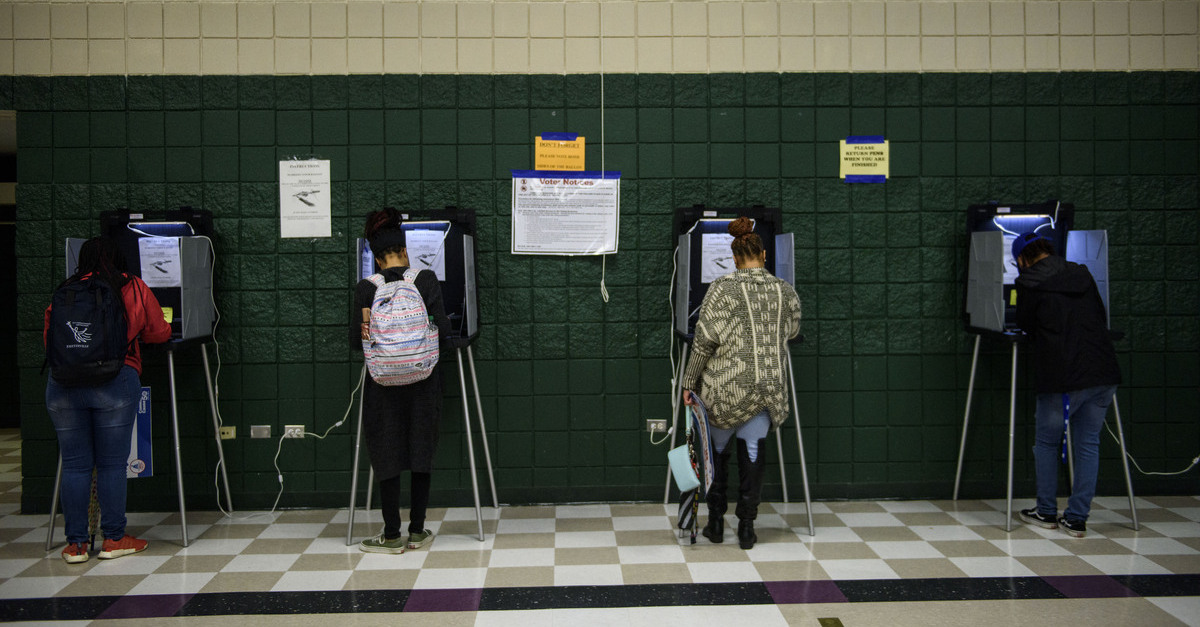
Fayetteville State University students fill out ballots at Smith Recreation Center on March 3, 2020 in Fayetteville, North Carolina.
A state court in North Carolina on Monday ruled that people who were previously incarcerated now have the right to vote.
The decision, which takes immediate effect for now but which may end up being stayed pending appeal, stands to impact upwards of 55,000 people who were denied access to the franchise.
According to Carolina Public Press, news of the decision was released before the formal opinion was published when Fifth Superior Court Judge Lisa Bell told the plaintiffs and defendants in the case stylized as CSI v. Moore that she and fellow Judge Keith Gregory had ruled in favor of the pro-voting rights side by voting to immediately apply a ruling from last year to all formerly incarcerated individuals who are currently on “community supervision,” a form of probation.
Judge John Dunlow was the lone dissenter on the three-judge panel.
“The court as of today is granting plaintiffs’ request for a preliminary injunction that prohibits the state defendants from refusing to register to vote any person on community supervision, whether a state felony conviction or a federal conviction,” Bell said during the phone call announcing the court’s history-making ruling.
The text of the opinion itself was still pending as of this writing.
“Everyone on felony probation, parole or post-supervision release can now register and vote, starting today,” Stanton Jones, an attorney who represents the parties challenging the law, said in a text message to The News & Observer on Monday morning.
“When I heard the ruling, I wanted to run in the street and tell everybody that now you have a voice,” Diana Powell, executive director of Justice Served N.C., one of the litigants in the case, said during a press call. “I am so excited for this historic day.”
North Carolina’s “felon disenfranchisement” law has racist origins. The extant prohibitions against formerly incarcerated people being able to vote was a byproduct of the efforts to undo Reconstruction Era progress by racist white lawmakers who rewrote North Carolina’s constitution in 1876. In addition, uncontested expert testimony introduced at trial last week noted that the law, in practice, disproportionately impacts Black people in the Tarheel State to this day.
“Black men make up 9% of the voting-age population. They are 36% of those who are disenfranchised, largely frustrating aims of the 15th Amendment and the 1965 Voting Rights Act,” attorney Daryl Atkinson said during trial, the Public Press reported–a set of facts that were not contested by attorneys for the state.
While the legal challenge is focused on a 1973 amendment authored by three Black lawmakers which removed some of those barriers, the voting rights advocates side–which includes some North Carolinians impacted by the law–want the language tossed in its entirety.
In September 2020, the same three-judge panel issued a preliminary injunction against the portion of the law that kept formerly incarcerated people from voting if they had failed to pay certain fines or fees. Monday’s decision completes the trajectory of that previous victory.
Republicans, however, say they plan to appeal the lower court’s ruling.
“This case is not about felony disenfranchisement writ large,” N.C. attorney Orlando Rodriguez said during court last week. “This case is not about the criminal justice system and the various inequities that exist throughout the criminal justice system writ large.”
The state’s attorney reportedly admitted the law’s racist origins and its disproportionate impact on Black citizens but said that the 1970s changes to the law–initiated by Civil Rights leaders–should be able to rescue it from being struck down entirely.
Republican State Sen. Warren Daniel called the ruling a “power grab.”
“If a judge prefers a different path to regaining those rights, then he or she should run for the General Assembly and propose that path,” he told The N&O. “Judges aren’t supposed to be oligarchs who issue whatever decrees they think best.”
Despite the potentially time-limited nature of the achievement, its immediate impact was cause for celebration among voting rights advocates nonetheless. If the result is allowed to stand, North Carolina will be the only southern state where formerly incarcerated individuals are automatically allowed to vote.
“Our biggest quarrels in this state have been over what groups of people have a voice at the ballot box to be included in ‘We the People,’” Atkinson said at a press conference Monday before later adding: “Today, we enlarged the ‘we’ in ‘We the people’.”
[image via Melissa Sue Gerrits/Getty Images]
Have a tip we should know? [email protected]